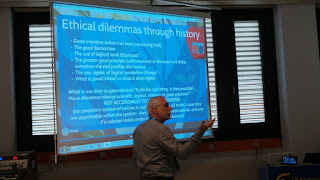Geoscience for the Public Good and Global Development:
Toward a Sustainable Future
Special Paper 520 of the Geological Society of America (GSA)
by Gregory R. Wessel* and Jeffrey K. Greenberg**
 |
| Jeffrey K. Greenberg |
 |
| Gregory R. Wessel |
email: gwessel@publicgeology.org
**Department of Geology and Environmental Science, Wheaton College, Wheaton, Illinois 60187, USA
email: jeffrey.greenberg@wheaton.edu
Picture at the top: Cover of the book
Disclaimer: the views expressed in this paper solemnly engage the authors
Two geologists (who did not know one another) each proposed and chaired similar sessions at the 2013 Geological Society of America Annual Meeting in Denver. Greg Wessel from the State of Washington chaired "Geology for the Common Good: Sustainable Resources for the 21st Century" and Jeff Greenberg from Illinois coordinated "Geoscience and International Development."
Upon recognizing their shared vision, they began a partnership to include a combined session for another GSA conference and a dream of publishing many articles to inspire other colleagues.
This book represents a lot of effort in gathering a comprehensive collection of very practical and hopefully inspirational papers. The ultimate goal of this work is to apply our science where it is needed most. The book's Introduction by the two editors and a Preface by GSA past-President, George Davis, provide overviews that should attract attention, not only to the 39 articles, but also to challenge geoscientists about their own motivations.
Articles are from a wide array of international authors. Many contributions are of global scope, as well as focused upon Africa (Ethiopia, Uganda, Nigeria, and Senegal), Asia (Bangladesh, The Himalayas, Thailand, Afghanistan, Iran, and Oman), the Americas (Haiti, Guatemala, Columbia, and the USA), Europe (Italy), and the Pacific Islands. Topical divisions for the papers range from: "Fundamentals and Foundations", through "Metals, Minerals, and Mineral Resources", "Water Resources", "Engineering, Public Safety and Urban Development", "Waste Management", "Geological Hazards and Risk Reduction", to "Multi-Agency and Regional Approaches."
It is greatly desired to see this volume get the widest distribution, beyond all academic institutions, on to government agencies, research groups, Non-Governmental Organizations (NGOs), and to many individuals and associations involved in decision making, development, and human-environmental relationships. The scope is truly interdisciplinary and multidisciplinary.
Information available at the GSA Website includes the following description:
Full Title: Geoscience for the Public Good and Global Development: Toward a Sustainable Future
Editors: Gregory R. Wessel and Jeffrey K. Greenberg
Description:
This publication offers an overview of the applications of the geosciences to sustainable development and geophilanthropic efforts worldwide, and offers advice to guide the creation of development projects. The primacy of geologic input to all development activities is highlighted along with problems that are encountered and environmental issues that must be addressed. General principles to follow are discussed, including guidelines for creating truly sustainable solutions, building foundations for effective international development, the importance of ethical and social values, the motivation behind sustainable development, and how geoscientists can best become development practitioners.
Numerous case studies provide examples of planning for sustainability in mineral resources, water resources, mitigation of geologic hazards, waste management, urban development, and regional evaluation of development constraints and opportunities. The reader should come away with a general understanding of how sustainable development projects might be organized and where they might be most successful.
[Table of Contents] [Foreword by G.H. Davis & Introduction]
Product Code: SPE520
Published: May 11, 2016
ISBN Number: 978-0-8137-2520-8
Pages: 478
Product Categories: B. Special Papers




















